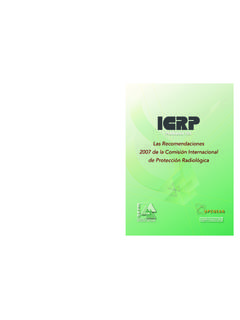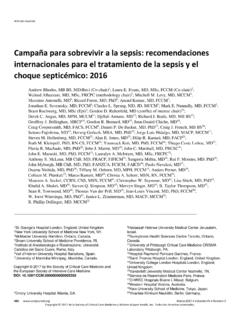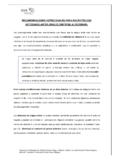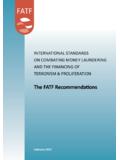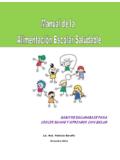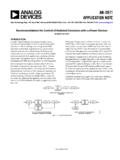Transcription of Hepatitis B and the health care worker - WHO
1 Which workers in the health care settingneed Hepatitis B vaccine? health care workers (HCWs) who have a reason-able expectation of being exposed to blood on thejob should be offered Hepatitis B vaccine. Thisdoes not include receptionists, clerical and billingstaff, etc., as these individuals are not expected tobe at risk for blood is the appropriate administration sitefor Hepatitis B vaccine and what needle sizeshould be used?A deep intramuscular (IM) injection into the del-toid muscle is recommended for adult Hepatitis Bvaccination. A 22 25 gauge, 1 1 needle shouldbe used, but a longer needle may be needed toreach deep into the muscle of obese a HCW s only dose of Hepatitis B vaccinewas four months ago, should the seriesbe restarted?No. The Hepatitis B vaccine series should not berestarted when doses are delayed; rather, the seriesshould be continued from where it left off.
2 Thevaccine recipient should receive the second doseof vaccine now and the third dose 2 5 it safe for HCWs to be vaccinated duringpregnancy?Yes. Pregnant women in occupations with a highrisk of Hepatitis B virus (HBV) infection ( ,HCWs who have a potential for exposure to blood)should be vaccinated. Hepatitis B vaccine containsno components that have been shown to pose a riskto the fetus at any time during gestation. An acute(or chronic) HBV infection in a pregnant womanposes a significant risk to the fetus or newborn forperinatal or in utero HCWs need serologic testing afterreceiving 3 doses of Hepatitis B vaccine?All HCWs should have serologic testing 1 2months following the final dose of the Hepatitis Bvaccine series. An anti-HBs serologic test result of>10mIU/mL indicates immunity. No further rou-tine doses or testing are should be done if a HCW s serologictest (anti-HBs) is negative 1 2 months afterthe last dose of vaccine?
3 You should repeat the 3-dose series and then testfor anti-HBs 1 2 months after the last dose of vac-cine. If the HCW is still negative after the secondvaccine series, the HCW is considered a non-responder to Hepatitis B vaccination. The HCWshould be counseled that non-response to the vac-cination series most likely means the HCW is sus-ceptible to HBV infection. The HCW should thenbe counseled to discuss what non-response to thevaccination series means for that specific HCWand what steps should be taken in the future toprotect his/her health . It is also possible that thenon-responder is chronically infected with testing can be offered or suggested to de-termine if this is the case. HBsAg test resultsshould remain s note: The Immunization Action Coalition thanks Linda A. Moyer, RN, epidemiologist, and EricE. Mast, MD, medical epidemiologist, both from the Division of Viral Hepatitis , National Center forInfectious Diseases, Centers for Disease Control and Prevention, for reviewing and updating the followingquestions and answers about Hepatitis B and the health care may need more shotsthan just Hepatitis B!
4 To find which ones, read theACIP statement Immunization of health -CareWorkers. It s available online at by calling CDC s NationalImmunization Information Hotlineat (800) 232-2522 CDC answers frequently asked questionsabout how to protect health care workers(continued on next page)Vaccination andantibody responsestatus of exposedworkers*UnvaccinatedPreviously vaccinatedKnown responder**Knownnonresponder Antibody responseunknownTreatmentSourceHBsAg positiveSourceHBsAg negativeSourceunknown or notavailable for testingHBIG x 1 and initiateHB vaccine series No treatmentHBIG x 1 and initiaterevaccination orHBIG x 2 Test exposed person foranti-HBs 1. If adequate,** notreatment isnecessary2. If inadequate, administerHBIG x 1 andvaccine boosterInitiate HB vaccineseriesNo treatmentIf known high risksource, treat as if sourcewere HBsAg positiveTest exposed personfor anti-HBs1.
5 If adequate,** notreatment is necessary2. If inadequate, administer vaccinebooster and rechecktiter in 1 2 monthsInitiate HB vaccineseriesNo treatmentNo treatmentNo treatment* Persons who have previously been infected with HBV are immune to reinfection and do not require postexposureprophylaxis. Hepatitis B surface antigen Hepatitis B immune globulin; dose is mL/kg intramuscularly. Hepatitis B vaccine**A responder is a person with adequate levels of serum antibody to HBsAg ( , anti-HBs >10 mlU/mL). A nonresponder is a person with inadequate response to vaccination ( , serum anti-HBs <10 mlU/mL). The option of giving one dose of HBIG and reinitiating the vaccine series is preferred for nonresponders who havenot completed a second 3-dose vaccine series. For persons who previously completed a second vaccine series butfailed to respond, two doses of HBIG are preferred. Antibody to HBsAgSource: Updated Public health Service Guidelines for the Management of Occupational Exposures to HBV, HCV,and HIV and Recommendations for Postexposure Prophylaxis, MMWR, June 29, 2001, Vol.
6 50 (RR-11): 22 Recommended postexposure prophylaxis for exposure to Hepatitis B virusHepatitis B and thehealth care workerImmunization Action Coalition 1573 Selby Ave. St. Paul, MN 55104 (651) 647-9009 Item #P2109 (10/03, reviewed 1/05)How often should I test health care workersafter they've received the Hepatitis B vaccineseries to make sure they're protected?Postvaccination testing should be done 1 2months after the last dose of Hepatitis B adequate anti-HBs is present (>10mIU/mL),nothing more needs to be done. Periodic testing orboosting is not needed. If the postvaccination testresult is less than 10 mIU/mL, the vaccine seriesshould be repeated and testing done 1 2 monthsafter the second series. This information should berecorded in the person's health a HCW who performs invasiveprocedures and who once had a positiveanti-HBs result be revaccinated if theanti-HBs titer is rechecked and is<10mIU/mL?
7 No. Postvaccination testing needs to be done onlyonce at 1 2 months after the vaccine series is com-pleted. If a HCW s test result indicated protection(anti-HBs >10mIU/mL) as a result of the originalvaccination series, no further serologic testing isindicated. Data show that adequate response to the3-dose series of Hepatitis B vaccine provides long-term immunologic memory that gives long-termprotection. Only immunocompromised persons( , hemodialysis patients, HIV-positive per-sons) need to have anti-HBs testing and boosterdoses of vaccine to maintain their anti-HBs con-centrations of at least 10mIU/mL to be protectedagainst HBV HCWs were vaccinated for Hepatitis B inthe past and not tested for immunity, shouldthey be tested now?No. In this scenario, a HCW does not need to betested unless he or she has an exposure. If an ex-posure occurs, refer to the table on the first pagefor management guidelines.
8 In addition to follow-ing these guidelines, if prophylaxis (HBIG and abooster dose of vaccine) is indicated, the personshould receive postvaccination testing 3 6 monthsafterwards. It is necessary to do postvaccinationtesting at 3 6 months because testing earlier mayonly measure antibody from HBIG. This postvac-cination test result should be recorded in theperson s health physicians in our group have nodocumentation showing they receivedhepatitis B vaccine. However, they arerelatively sure they received the doses manyyears ago. What do we do now?Unfortunately, inadequate documentation of vac-cination is common. Even if these physicians thinkthey may have been fully vaccinated, but it is notdocumented, the three-dose vaccination seriesshould be administered. Postvaccination testingshould be performed 1 2 months after the three-dose series. There is no harm in receiving extradoses of might suggest giving only one dose ofvaccine followed by postvaccination testing.
9 Al-though 30% of previously unvaccinated healthyadults will have a protective antibody responseafter only one dose of vaccine, these individualswill not have the long-term protection afforded bythe three-dose organization (hospital, clinic, etc.) shoulddevelop policies or guidelines about the documen-tation required to demonstrate valid Hepatitis Bvaccination. If policies are in place and documen-tation is not present, revaccination should be insti-tuted. care should always be taken to documentvaccine lot, date, manufacturer, route, and vaccinedosages. Postvaccination testing results shouldalso be documented, including the date serologictesting was m a nurse who received the Hepatitis Bvaccine series over 10 years ago and had apositive follow-up titer. At present, my titer isnegative. What should I do now?You don t need to do anything further. Current datashow that vaccine-induced anti-HBs levels maydecline over time; however, immune memory (an-amnestic anti-HBs response) remains intact indefi-nitely following immunization.
10 Persons withdeclining antibody levels are still protected againstclinical illness and chronic disease. For health careworkers with normal immune status who havedemonstrated an anti-HBs response following vac-cination, booster doses of vaccine are not recom-mended nor is periodic anti-HBs person who is a known non-responder tohepatitis B vaccine has a percutaneousexposure to HBsAg-positive to the ACIP recommendations, Ihave the option to give Hepatitis B immuneglobulin (HBIG) x 2 or HBIG x 1 and initiaterevaccination. How do I decide which to do?If the person is a true non-responder ( , failed toproduce adequate anti-HBs after two full vaccineseries), it seems illogical to give a third hepatitisB vaccine series. The two-dose HBIG regimenwould be the better choice. The first dose of HBIG( ) should be given as soon as possibleafter exposure and the second dose (same dosage)given one month later.










